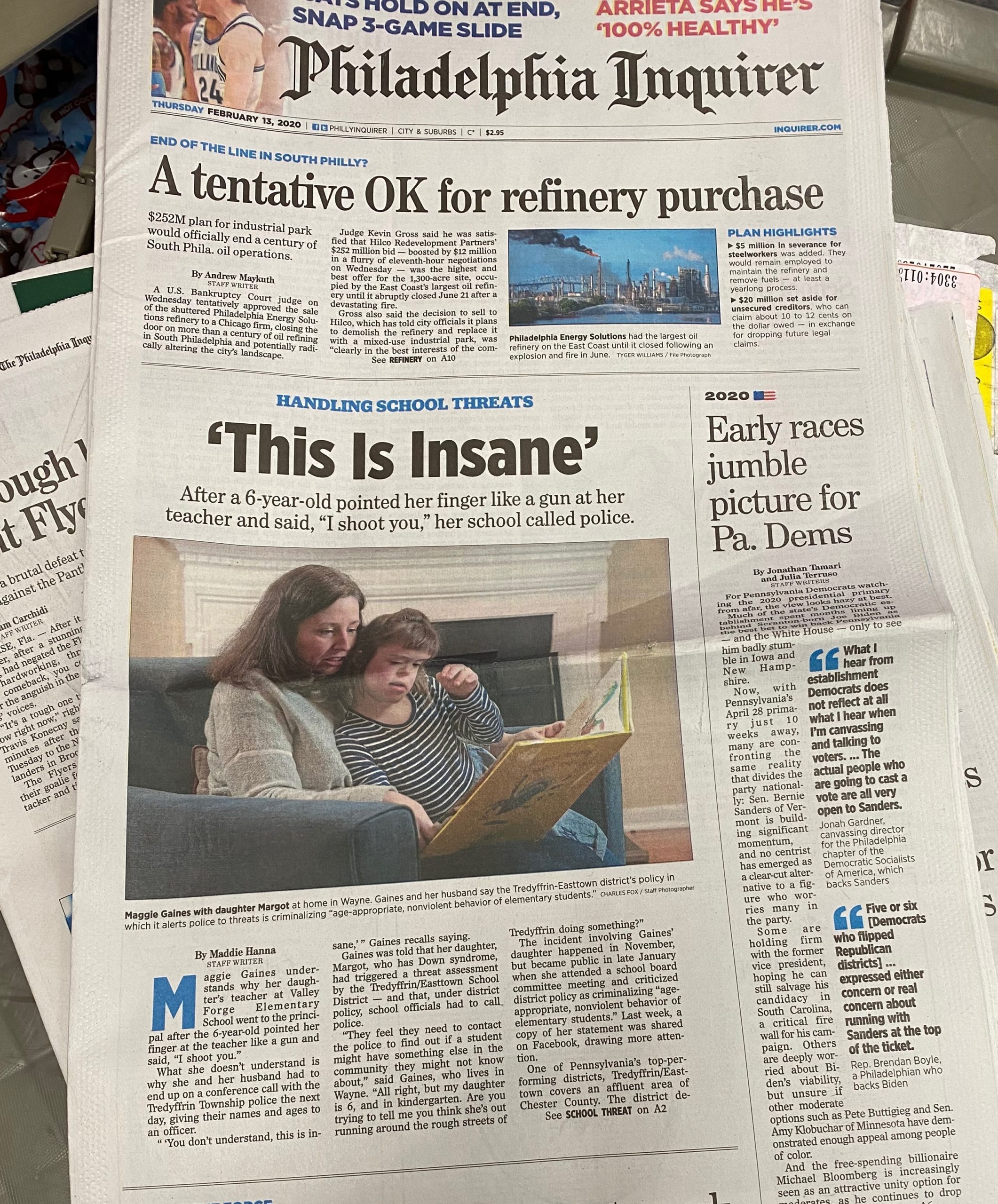 The headlines about the kindergartner with Down Syndrome who was reported to the police for pointing a finger gun continue to roll in with no end in sight. There are countless articles in major newspapers, on network TV stations, Facebook groups, website and blogs on the issue all touting shock and disbelief that this has happened.
The headlines about the kindergartner with Down Syndrome who was reported to the police for pointing a finger gun continue to roll in with no end in sight. There are countless articles in major newspapers, on network TV stations, Facebook groups, website and blogs on the issue all touting shock and disbelief that this has happened.
From the New York Daily News, Washington Post, Education Week, The Daily Mail (UK), ABC, CBS, FOX, NBC, CNN and on and on, including the front page of the Philadelphia Inquirer today, the story of the 6-year-old Valley Forge Elementary School student has garnered much attention.
I have remained troubled since attending the school district policy meeting on February 4 and listened to Maggie and Mark Gaines, the parents of the special needs kindergartner caught in the middle of the debate, and to others referencing behavior problems that went unreported to the police. From school district parents, it is unclear which student behaviors constitute a requirement to “consult” with police – the inconsistencies were glaring.
I simply do not understand how a middle school child can suffer a concussion at the hands of another student and there is no investigation from the school district yet on the opposite end of the spectrum, there is a special needs kindergartner who is reported to the police for pointing her finger like a gun. If perceived “threats” require police involvement, then my question is what does it take to get attention for serious physical assaults in the District?
Was contacting the police the appropriate handling of a special needs child with specific behavioral issues? Late this afternoon, an editorial written by Dr. Kim Doan, a professor in the Special Education Department at West Chester University appeared in the Daily Local and helps answer that question.
A special education educator for 23+ years and a parent, Dr. Doan attended the TESD policy meeting and suggests that the District’s student behavior policy is in violation of Federal legislation,
The Individuals with Disability Education Act (IDEA) requires schools to individualize the education of children with special needs and that includes in discipline. A district policy cannot supersede federal legislation. Applying a policy in a “one size fits all” manner is tantamount to the violation of IDEA.
In assessing the student behavior policy of TESD, Dr. Doan states the following:
A policy, legislation, or assessment tool can be well written and thoughtfully designed but if the adults involved are not trained or consistent, then error is inevitable. Common sense should take precedence over all written policy. Let’s not criminalize our kindergartners before they’ve even learned their ABCs and 123s. The next time a similar event arises, consider the child for who he/she is as a whole person and think about why this little one made the statement to the teacher. We must remember that behavior is communication.
But rather than updating the student behavior policy to address special needs children as suggested by Dr. Doan, the school board is digging in its heels. At the policy meeting, all but two school board directors (Scott Dorsey and Todd Kantorczyk) in attendance support the current policy, which includes reporting a six-year-old with Down Syndrome to the police.
Calling the police for a little kindergartner with Down Syndrome has become a public relations nightmare for the school district — adverse media attention is problematic. And touting the high performance test scores of our school district is not going to work this time; the problem is not going away. As the entire country (and beyond!) looks at the situation in disbelief, the District doubles down on the policy.
To be clear, the Valley Forge Elementary School teacher and the principal were doing their jobs when they called the police. The Tredyffrin Police in turn were doing their job. The problem is the District policy – we all want our children to be safe at school but the current policy goes too far.
Where does the school district go from here … ?